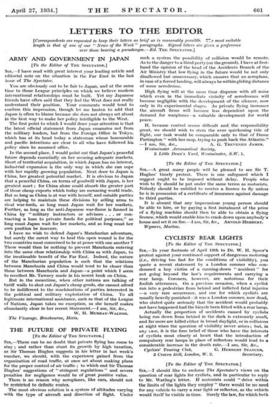LETTERS TO THE EDITOR
[Correspondents are requested to keep their letters as brief as is reasonably possible. T.!..e most suitable length is that of one of our " News of the Week" paragraphs. Signed letters are given a preference over those bearing a pseudonym.—Ed. THE SPECTATOR.] ARMY AND GOVERNMENT IN JAPAN [To the Editor of THE SPECTATOR.] SIR,—I" have read with great interest your leading article and editorial note on the situation in the Far East in the last issue of The Spectator.
You are obviously out to be fair to Japan, and at the same time to those League principles on which we believe modern international relationships must be built. Yet my Japanese friends have often said that they feel the West does not really understand their position. Your comments would tend to confirm this impression, though let me hasten to add that Japan is often to blame because she does not always set about in the best way to make her policy intelligible to the West.
The first point to which I would draw your attention is that the latest official statement from Japan emanates not from the military leaders, but from the Foreign Office in Tokyo, which has at its head today a statesman whose honourable and pacific intentions are clear to all who have followed his policy since he assumed office.
In the second place, I would point out that Japan's peaceful future depends essentially on her securing adequate markets. Short of territorial acquisition, in which Japan has no interest, industrial expansion is the only way in which she can cope with her rapidly growing population. Next door to Japan is China, her greatest potential market. It is obvious to Japan that a peaceful China, on terms of goodwill with Japan, is her greatest asset ; for China alone could absorb the greater part of those cheap exports which today are menacing world trade. But as long as China is at war with herself, and outside parties are helping to maintain these divisions by selling arms to rival war-lords, so long must Japan wait for her markets. Further, as long as the anti-Japanese war-flame is fanned in China by " military instructors or advisors . . . or con- tracting a loan to private funds for political purposes," so long must Japan wait for her markets, and so long must her own position be insecure.
I have no wish to defend Japan's Manchurian adventure, but surely the surest way to heal this open wound is for the two countries most concerned to be at peace with one another ? There would then be nothing to prevent Manchuria entering into the same close relationship with China as with Japan, to the inestimable benefit of the Far East. Indeed, the nature of the Manchurian population is such that the relations between Manchuria and China would tend to be closer than those between Manchuria and Japan—a point which I seem to recollect Mr. Tawney made in his recent book on China.
But in the meantime, when other nations are talking of tariff walls to shut out Japan's cheap goods, she cannot afford to be indifferent to the machinations of parties interested in the political and military exploitation of China. To all legitimate international assistance, such as that of the League of Nations, Japan takes no exception, as she herself makes abundantly clear in her recent Statement.—I am, Sir, &c.,












































 Previous page
Previous page